Latest News
13-Nov-2018Greater Mekong Subregion: Fight against counterfeit drugs
At a conference in the Cambodian capital Phnom Penh the Mekong neighboring states now announced an intensification of their joint efforts to fight substandard and falsified medicines. Experts assume that in Southeast Asia for instance 30 percent of antimalarial drugs are of poor quality.
To control the quality of the medicines offered in the Greater Mekong Subregion already more than 150 GPHF-Minilabs are in place and more training courses in the use of the mobile lab are scheduled for 2019. For more information please see here.
08-Oct-2018
Appeal for global access to quality-assured medicines
“Every person has the right to expect that when they use a medicine or medical product, it works” – with this urgent appeal the conference “Medicine Quality & Public Health”, held in Oxford, UK from 23 to 28 September, has ended. According to figures issued by the WHO in November last year, 1 in 10 medical products in low and middle-income countries being of poor quality, a gross failure or an outright fake. In the so-called Oxford Statement the conference participants demand concrete measures to address this matter.
Dr. Richard Jähnke represented the Global Pharma Health Fund (GPHF) during the conference, attended by 200 experts form 50 countries. Here the GPHF-Minilab™ was praised as an important contribution to fight counterfeit drugs and to improve the quality of the pharmaceutical supply. For more information please see here.

Prof. Dr. Moji Christianah Adeyeye, General Director of the Nigerian Medicines Control Agency and Dr. Richard Jähnke from the GPHF in Oxford.
29-Aug-2018
GPHF will join international congress
The GPHF will participate in the international congress “Medicine Quality in Public Health” in September in Oxford, UK. Representing the GPHF, Dr. Richard Jähnke will speak on the GPHF-Minilab™ and the long-time experiences of the GPHF in fighting counterfeit drugs. The congress will take place from 23 to 28 September at the University of Oxford and is sponsored by the World Health Organization and the Bill & Melinda Gates Foundation among others. For more information please see here.
28-Aug-2018
DIFAEM welcomes GPHF-Minilab™
In its new Annual Report the German Institute for Medical Mission (DIFAEM) welcomes the GPHF-Minilab™ and its benefits for the drug safety in developing countries. In the past years DIFAEM has established a network of minilabs with 17 partners in in eleven African countries to protect people from counterfeit drugs. DIFAEM recalls that back in 2017 a total of 1.032 samples were analyzed within the network and out of this seven samples were classified as serious and dangerous fake. In two cases the World Health Organization thereupon released an international drug alert.
18-May-2018
Thousands of fake anti-malaria tablets detected
Once again the GPHF-Minilab™ has proven its importance for a safe and high-quality pharmaceutical supply. Thanks to the mobile lab of the GPHF 60.000 fake anti-malaria pills were identified in a hospital in Cameroon. The tablets only contained 2.6 percent of the substance declared. In case of need that kind of pills would have no effect. For more information please see here.
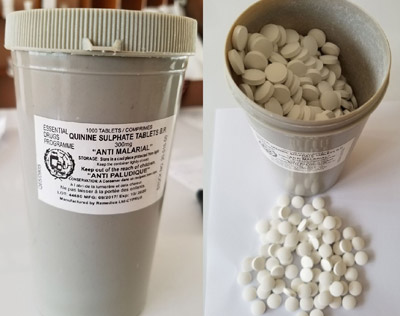
Cameroon: Fake quinine tablets with 2.6% of active pharmaceutical ingredient only. (Picture Credit: DIFAEM)
15-Mar-2018
GPHF elected new members oft he board
On the occasion of its general meeting the Global Pharma Health Fund (GPHF) has elected new board members. Dr. Johannes Waltz is now acting as Chairman and Dr. Jutta Reinhard-Rupp as Vice Chairwoman of the GPHF. The former Chairwoman Friederike Segeberg and the former Vice Chairman Frank Gotthardt decided not to run for reelection. Doris Meier will continue to serve as Treasurer of the GPHF.
Apart from that the members of the GPHF summarized a successful project work of the fund. Last year 41 more GPHF-Minilabs were delivered and the enlargement of the test methods of the mobile lab to detect counterfeit drugs was well on track too. Worldwide 836 labs are now in place and the methods are available for 90 important and widespread pharmaceutical ingredients.
12-Feb-2018
GPHF-Minilab™ now capable of testing 90 drug compounds
The Global Pharma Health Fund (GPHF) is pleased to announce the release of more test protocols for its Minilab. The new method inventory will now allow the testing of more high volume over-the-counter analgesic and antiallergic medicines. The Minilab supplement 2018 contains new test protocols for naproxen, mefenamic acid, diclofenac, cetirizine and chlorphenamine including appropriate co-formulations, for example with paracetamol and phenylephrine. Demo versions of the new test methods can be accessed in English, French and Spanish at this homepage.
24-Jan-2018
Once again falsified antibiotic identified
Thanks to the GPHF-Minilab™ once again a falsified antibiotic was identified. The tablet contains only 2.5 % of the declared dosage and is without any effect. For more information on the case from the Democratic Republic of Congo please see here.
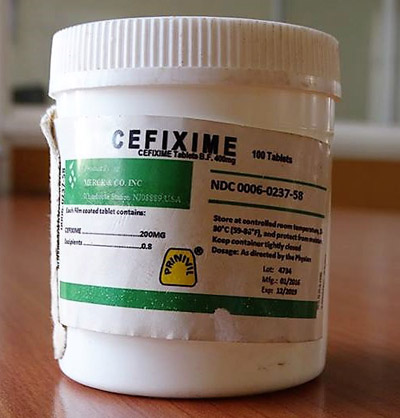
Falsified antibiotic circulating in Congo DR. (Picture: DIFAEM)
22-Jan-2018
Report on Dr. Jähnke and the GPHF-Minilab™
The international journal The Analytical Scientist now has published a ten-page report on Dr. Richard Jähnke from the GPHF and his work with the GPHF-Minilab™. The report is based on the Humanity in Science Award Dr. Jähnke was awarded with in 2017. For the report please see here.
12-Jan-2018
Number of GPHF-Minilabs once again increased
Also in 2017 the number of GPHF-minilabs to protect people from the danger of counterfeit drugs increased. 41 new labs took up operation last year and to this day a total of 836 mobile labs are in practice, most of them in Africa and Southeast Asia. With the assistance of the GPHF-Minilab™ it is possible to identify counterfeit medicines rapid, reliable and at low costs. In many cases the minilab has already contributed to the identification of counterfeit drugs and to protect people from a sometimes deadly threat. For an update on the number of GPHF-Minilab in operation please see here.
09-Jan-2018
Minilab Capacity Building in Nigeria
Late last year, fifteen people from the faith-based Central Medical Stores in Enugu (Nigeria) have been introduced to the Minilab’s operation procedures for rapid medicine quality monitoring. For more information please see here.

Group picture with the participants of the minilab training course in Enugu, Nigeria.
12-Dec-2017
Minilab Training in the Chad
In the Chad in Central Africa another minilab training has taken place in November. A total of thirteen people from different healthcare facilities attended the course and were instructed in the use of the mobile lab for the identification of counterfeit drugs. Also during the training session a medicine with suspicious ingredients has been identified. For more information please see here.
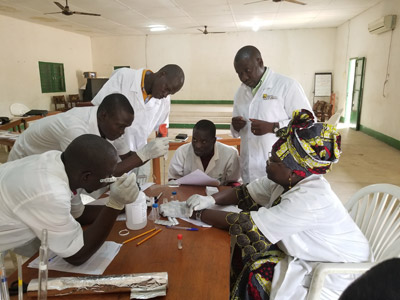
Participants of the minilab training in the Chad.
06-Dec-2017
WHO: New Reports on Counterfeit Drugs
For the first time in 10 years, WHO now has published two reports on the issue of falsified medicines. The first estimates the impact of substandard and falsified medical products in low- and middle-income countries In conjunction with these estimates, WHO has launched a second report “Public health and socioeconomic impact of substandard and falsified products” highlighting the potential financial and public health impact of caused by these products. For more information on these reports please see here.
29-Nov-2017
Minilab detects a counterfeit drug once again
Thanks to the GPHF-Minilab™ a falsified medicines without the declared antibiotic and, hence, non-effective and harmful was discovered once again. The incident occurred in Cameroon (West Africa), where staff members of the DIFÄM-EPN-Minilab-Network saw a suspicious Penicillin-V tablet at a street shop. A first quality check with the Minilab confirmed the first suspicion and much more sophisticated laboratory analysis at the Pharmaceutical Institute of the University in Tübingen made it clear: the sample certainly contains no antibiotic. Meanwhile, the World Health Organization issued an appropriate rapid medical product alert.
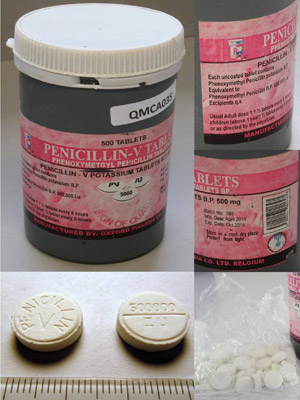
Pictures of the fake Penicillin-V discovered in Cameroon (Photos: University Tübingen)
08-Nov-2017
Richard Jähnke received international science award
Pharmacist Richard Jähnke (PhD), GPHF-Minilab project manager at the Global Pharma Health Fund (GPHF), won the international science prize “Humanity in Science Award” this year. The international jury of experts honoured the results of many years of research in method development by Jähnke for the detection of substandard and fake medicines in low-income countries. The collection of non-sophisticated test methods are allowing the verification of drug quality for a multitude of essential medicines in a fast, reliable and affordable fashion. This will help in safeguarding patients otherwise consuming and being victims of the dangerous trade in spurious medicines. Combined with appropriate lab ware, the GPHF-Minilab, these methods are used in almost a 100 countries across the world already. The “Humanity in Science Award” worth US$ 25.000 was launched in 2014 by the expert magazine The Analytical Scientist and is issued annually. The award rewards analytical and diagnostic methods having a direct impact to change the lives of people to the better.

Rich Whitworth, Chief Editor of The Analytical Scientist, presented the Humanity in Science Award 2017 to Dr. Richard Jähnke (right).
18-Oct-2017
Minilab Training in Mauretania
End of September, staff from the National Drug Quality Control Laboratory of Mauretania have been trained for one week in the operation procedures of the newly acquired Minilab developed by the Global Pharma Health Fund (GPHF). The trainer Nyaah Fidelis Bah Ngoh came from Cameroon where he works as a pharmacist in the Central Pharmacy of the Presbyterian Health Service.
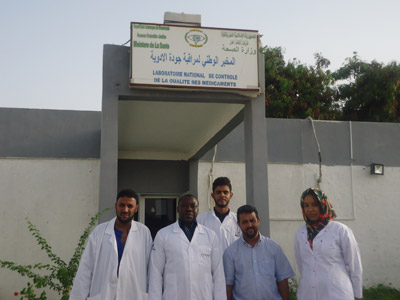
The participants of the training in front of the National Drug Quality Control Laboratory in Mauretania. (Picture: Ngoh)
12-Oct-2017
Minilab workshop at the University of Tübingen
During the second course “Pharmacy in International Health and Disaster Operations” at the pharmaceutical institute of the University of Tübingen once again a special workshop on the GPHF-Minilab™ took place. Dr. Richard Jähnke, project manager of the GPHF, presented the mobile lab and instructed the participants in its proper use. For more information please see here.
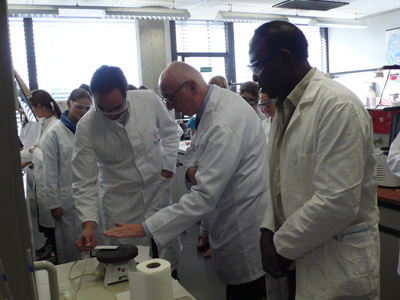
Dr. Jähnke (centre) demonstrated the correct operation with the minilab. (Picture: Heide)
08-Sep-2017
International survey confirms the importance of the GPHF-Minilab™
Once again an international survey has confirmed the meaning of the GPHF-Minilab™ for the reliability and quality of medicine especially in low- and middle-income countries. By using the mobile lab of the GPHF in seven countries in Africa and Asia nearly 900 medicine samples were examined and 21 were confirmed to be substandard or falsified medical products. The survey has been run by the Difäm-EPN Minilab Survey Group, who is convinced, that surveillance for poor-quality medicines can be carried out by local organizations in low- and middle-income countries using a simple, low-cost technology. Such surveillance can identify an important subgroup of the circulating substandard and falsified medical products and can help to prevent them from causing harm in patients.
The survey, titled “Surveillance for falsified and substandard medicines in Africa and Asia by local organizations using the low-cost GPHF Minilab” now is published in PLOS ONE, a peer-reviewed open access scientific journal. For more information please see here.
24-Aug-2017
Minilab Workshop in Cameroon
In Limbe at Cameroon’s Atlantic coast once again a workshop on the use of the GPHF-Minilab™ was held. Participants of the one-week session were 14 representatives of the Ecumenical Pharmaceutical Network from Ghana, Malawi, Uganda, India and Cameroon. Trainer was Professor Lutz Heide from the Tübingen University in Germany. For more information please see here.
03-Jul-2017
GPHF started ten years ago
Exactly ten years ago, in July 2007, the Global Pharma Health Fund (GPHF) started his project work. At that time the GPHF succeeded the German Pharma Health Fund, a joint initiative of pharmaceutical companies in Germany to promote healthcare projects in developing countries. Since 2007 the GPHF is exclusively supported by Merck. The international science and technology company already was one of the founders of the German Pharma Health Fund back in 1985.
One of the main reasons for Merck to become the initiator of the new GPHF was to guarantee the continuation of the GPHF-Minilab™ project Back in 2007 the minilab had already proven its value to fight counterfeit drugs but with the backing of Merck the number of minilabs working all over the world increases rapidly. Today more than 820 labs in almost 100 countries are in place. Also the number of ingredients to be analyzed by the mobile lab rose from 40 to currently 90. Specialized minilab trainings, running in developing countries, became a regular part of the project too. Today, in many places the GPHF-Minilab is an important component of the local drug monitoring that helps to protect people from the deadly danger of counterfeit drugs.
08-Jun-2017
Once more the GPHF-Minilab™ identifies a fake medicine
Once again the GPHF-Minilab™ has unmasked a counterfeit medicine. By using the mobile lab, in the Democratic Republic of the Congo staff members of the Ecumenical Pharmaceutical Network detected a so called medicine to treat malaria completely lacking the active pharmaceutical ingredient. For more information please see here.
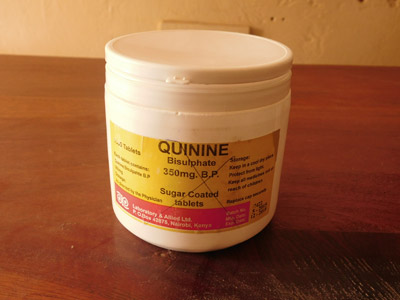
Counterfeit tablets with no quinine found in DR-Congo
04-May-2017
Minilab training in Cameroon
Like many African regions also the hospitals and healthcare facilities in northwest Cameroon near the Nigerian border are affected by the potential danger of counterfeited or substandard medicines. To test the quality of the drugs on site and to protect people from the danger of counterfeit drugs now for the first time a GPHF-Minilab™ should be used in the region. In a training course, which took place in the hospital in Njinikom, Dr. Richard Jähnke form the Global Pharma Health Fund (GPHF) instructed local healthcare staff in the use of the mobile lab. For more information please see here.
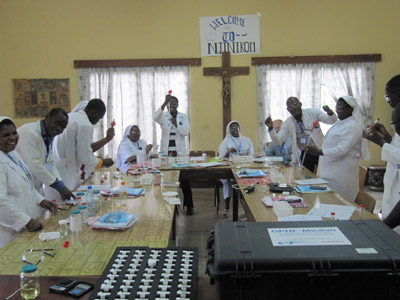
The St. Martin de Porres Catholic General Hospital in Njinikom hosted the training.
21-Mar-2017
Merck donates six GPHF-Minilabs to Sierra Leone
Merck now has made a donation of six GPHF-Minilabs, representing a total value of more than 30.000 Euro, for the use in Sierra Leone. The recipient of the mobile labs is the National Pharmaceutical Quality Control Laboratory in Freetown, the capital of Sierra Leone. The donation was initiated and financed by Merck Northwest Africa. The country organization has already supported the project work of the GPHF in the past.
Sierra Leone belongs to the poorest and least developed countries in Africa. The outbreak of the Ebola fever in 2014 has aggravated the humanitarian situation even further. The GPHF-Minilabs should contribute to a better quality control of the drugs provided on site to protect people from the danger of counterfeit and substandard drugs.
Merck, a leading science and technology company and at the same time the oldest pharmaceutical and chemical company in the world, supported the project work of the GPHF for a long time and is committed to the improvement of healthcare in Africa. The donation of minilabs is part of this engagement.
09-Mar-2017
Successful Project Work
During his general meeting the Global Pharma Health Fund drew a very successful balance on his project work in 2016. 64 GPHF-Minilabs were delivered, so in total, by the end of the year 795 mobile labs were situated in 95 countries worldwide. In addition to the execution of four special training courses on the Minilab in Kenya, Zambia, Rwanda and Mozambique the GPHF has again been able to integrate five new ingredients to the test methodology of the lab. Now 85 active ingredients can be analyzed. Also in the future, the focus of the project work of the GPHF will be on the further development of the Minilab, reconfirmed the participants of the meeting. At the general meeting Doris Meier was elected as the new treasurer of the Global Pharma Health Fund.
09-Feb-2017
GPHF-Minilab™ now capable of testing 85 drug compounds
The Global Pharma Health Fund (GPHF) is pleased to announce the release of more test protocols for its Minilab, a self-contained mini-laboratory for rapid drug quality verification and easy detection of falsified medicines. The Minilab is particularly suitable for areas of the world where counterfeiting is prevalent but sophisticated tools for their detection are not readily available.
Minilab users clearly benefit from this performance improvement, for example the identification and content verification of more vital medicines to treat infectious and cardiovascular diseases (cefpodoxime, chlorhexidine, dapsone, efavirenz and amlodipine). The new method inventory includes also prevailing fixed-dose combination formulations for amlodipine and efavirenz, for example amlodipine combined with HCT or atenolol and efavirenz combined with tenofovir, emtricitabine or lamivudine. The gap on essential antiretrovirals is closed with an update on current nevirapine FDCs.
The latest Minilab supplement is published jointly with the Promoting the Quality of Medicines (PQM) programme run by the United States Pharmacopeial Convention (USP). Demo versions of the new test methods can be accessed in English, French and Spanish on this homepage. Printed copies are available at our logistic partner Technology Transfer Marburg (TTM).
